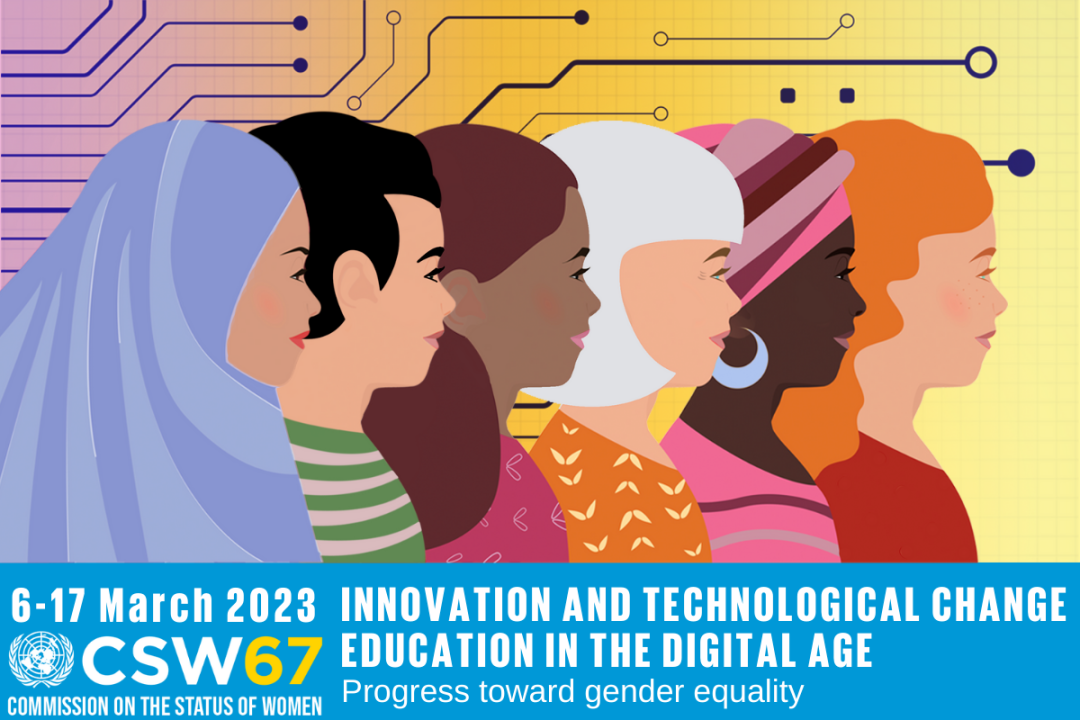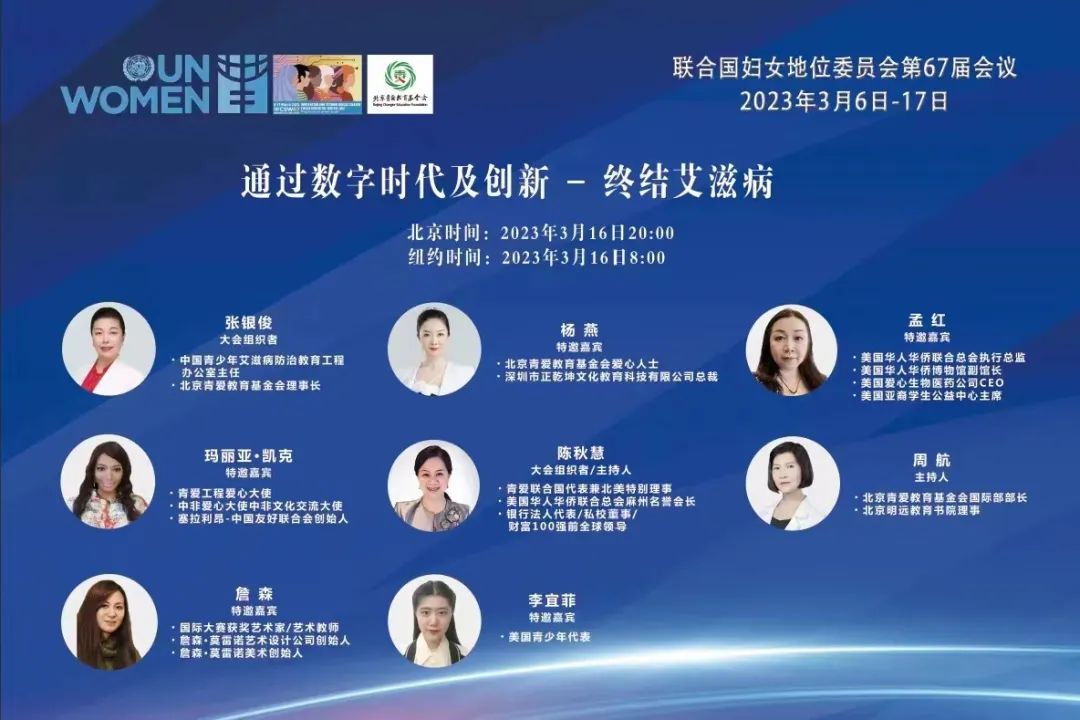Beijing Changier Hosts the UN CSW67 Parallel Events

Themed on “Innovation and technological change, and education in the digital age for achieving gender equality and the empowerment of all women and girls,” the 67th session of the Commission on the Status of Women (CSW67) was held at the United Nations (UN) headquarters in New York from March 6 through 17 this year. The session registered nearly 10,000 participants, with UN Secretary-General António Guterres, Chair of CSW67 Mathu Joyini, UN Women Executive Director Sima Sami Bahous, and ministers and other high-level officials witnessing the opening session.
Beijing Changier Education Foundation, an NGO in special consultative status with the UN’s Economic and Social Council, hosted three virtual parallel events during the CSW67. UN officials, NGO representatives and youth representatives from different countries delivered speeches, updated the latest global developments, hands-on experience and future progression in related fields and exchanged their deep insights into how we achieve gender equality, promote climate justice and end AIDS through advanced technologies and innovative channels in the digital age. Nearly 1,000 youth representatives from China, the U.S., the Philippines, Cameroon, Sierra Leone, Costa Rica and so forth joined the three parallel events.
A parallel event themed on “Ending AIDS through Innovation in the Digital Age” was held online on March 16.
The UN has pledged to end AIDS by 2030. While this may be true, it could end up being “a promise in the wind,” a result of reduced spending on AIDS prevention in some countries, the pandemic fallout and public fatigue of the seemingly never-ending contagion, said Zhang Yinjun, organizer of the parallel event who is also the director of the AIDS Prevention Education Project for Chinese Youth (APEPCY) Office and chairwoman of Beijing Changier Education Foundation. Digitalization and innovation have magnified Changier’s efforts in empowering education to end AIDS. The practice of promoting sexual education to prevent AIDS, initiated by Changier, was hailed as a societal vaccine against HIV by the industry in China and abroad and called “a pioneering act to tighten the faucet at upstream” by UNAIDS. Thanks to the power of mass media, the outcome has been able to spread from China to the rest of the world and benefit hundreds of millions of youth and women. In the year ahead, Changier will continue to integrate a wide range of resources with IT, including administrative, material and educational resources, to help end the AIDS epidemic by 2030.

Mariatu Kargbo, founder of the Sierra Leone China Friendship Association, caring ambassador of the APEPCY and an advocate of China-Africa cultural exchanges, shared her visit to Linfen Red Ribbon School in northern China’s Shanxi province where she met HIV-infected children. She also praised Changier for funding the school consistently and improving HIV-positive children’s treatment and medication.
Holly Meng, CEO of EXIN BioPharma Inc., deputy curator of the American Chinese Museum, executive director of the American Chinese United Association and president of the American Center for Asian Students, disclosed massive data to reveal what high-tech innovations and achievements mankind have ever made to prevent AIDS in the new era. Her speech, a beacon of hope for the cure of AIDS, also called on the wider community to remove the stigma attached to and discrimination against AIDS, thus fostering a supportive and inclusive environment.
Yang Yan, president of Shenzhen Zhengqiankun Culture Education Technology Co., Ltd., has long been committed to philanthropy. She told her story of how she started making financial donations to fund Changier long ago and discussed her experience of piloting the “live-streaming + philanthropy” mode to disseminate knowledge of AIDS prevention and promote philanthropy.
When talking about the serious impact that the COVID-19 pandemic and gender inequality have had on global AIDS prevention, Jensen Moreno, the award-winning artist and the founder of Jensen Moreno Arts and Design Company & J. Moreno Fine Arts, noted that women play an indispensable role in all societies. To end AIDS, we must improve the situation of women and girls, eliminate gender inequality and ensure that women and girls are provided with equal access to education and healthcare.
Jessica Li, a student of the Chinese-American high school who had listened side events of CSW65 and CSW66 hosted by Changier, said that from a listener to a speaker, she’d been motivated by inspiring female leaders who advocate for improving women’s status and advancing gender equality. She realized lack of knowledge is a weighted driver of AIDS infection, particularly in remote and underdeveloped regions, and that’s why she decided to establish Amaris Education Foundation, an NGO committed to bettering childhood education in remote areas. Besides, she’s leveraging social media fundraising to help Changier build love cottages. Seeing herself as a representative of the young generation, Li said she hopes that digital media technology could engage as many people as possible in the cause of global AIDS prevention.
Zhou Hang, director of the Department of International Exchanges at Beijing Changier Education Foundation and council member of Beijing Mingyuan Institute of Education, and Emma Chen-Banas, UN representative & special director for North American Affairs of Beijing Changier Education Foundation and honorary chairwoman of American Chinese United Association, moderated the panel discussion and the Q&A session, respectively.